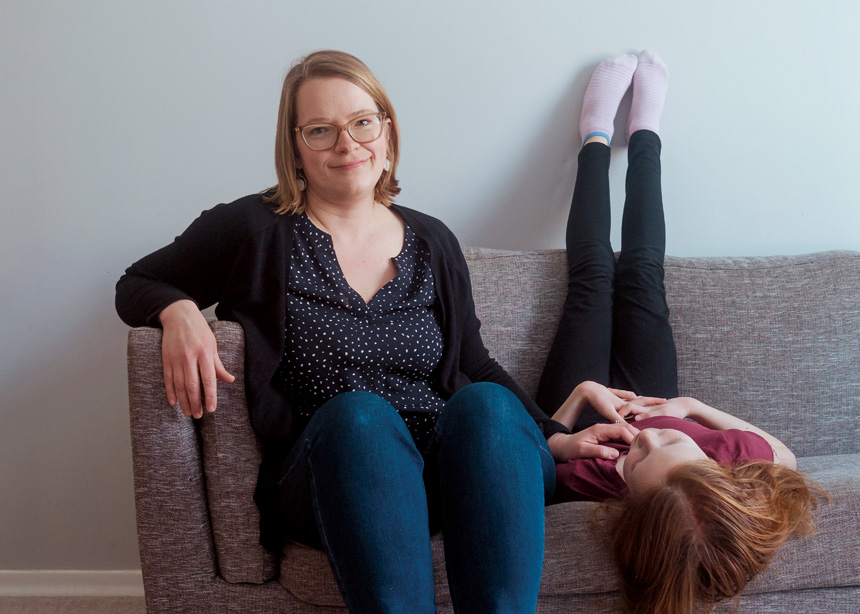Part I: For Junia Grace, 2017

I don’t like to write sermons. I am, at best, an unlikely preacher in our small Mennonite church.
I languished through theology courses in college, earning mostly high C’s. I feel easily overwhelmed when researching scripture, and I have no knowledge whatsoever of Greek or Hebrew. I’m constantly sending rough drafts to my pastor friends to ensure that my words from behind the oak pulpit aren’t inadvertently heretical.
Why, then, do I sign up for the quarterly preaching rotation?
I do it because I have a 3-year-old daughter.
Junia Grace, our firstborn, arrived in the pre-dawn hours of a beautiful late September day in 2014. Her arrival changed me in every way that I expected it would. My body was pushed to the physical limits of sleep deprivation. I grew more emotionally tender with each passing day. Spiritually, I felt myself opening to new possibilities as I finally understood the fierce, protective and devoted love of a parent.
However, Junia also began to change me in a way I had not expected: theologically.
I was first introduced to the concept of biblical gender equality and egalitarianism in a gender studies course during my third year of college. The revelation that God did not prefer my boyfriend to me was, in no uncertain terms, life-altering.
I was raised to believe men are the head of the home and the leaders of the church. A woman never stepped behind the pulpit unless she was a missionary, home on furlough. And, of course, she “shared”; she did not preach.
I joyfully embraced the new notion of equality. And when that boyfriend and I married two years later, we agreed that our future children, female and male, would know that they stood equal before God.
When we relocated to Saskatchewan in 2016, we made certain to choose a denomination and church that affirmed women as pastors. Our church, Langham Mennonite Fellowship, in the small Saskatchewan town of Langham, is led by male and female elders, and both sexes are encouraged to participate in all areas of church life, including preaching. It was a perfect fit for our growing family.
However, I soon noticed that only men were preaching. The opportunity to preach was open to all and encouraged by our pastor, but only men seemed to volunteer.
The reasons women did not step forward were as varied as the women in the congregation. Some devoted countless hours to other ministries in the church. For others, the fear of public speaking was insurmountable. And I suspect that for some, who were raised as I was, the weight of past beliefs about women’s roles kept them from preaching.
As the Sundays passed, an uncomfortable feeling settled into my spirit. What about me?
I protested inside. I wasn’t “called.” I did not have sufficient education. I was not interested in theology. I simply was not a preacher.
But my blue-eyed girl, sitting next to me in the pew, had yet to see a woman preach. What good, I feared, would it do Junia to know that she was equal, but only in theory?
How could she envision herself preaching if there were no women to spark her imagination? How could she be what she could not see?

When our pastor approached me a few weeks later and asked me if I would be willing to preach while he was away the following month, I heard my voice say, “Yes.”
I needed my daughter to believe that the Holy Spirit that rained down on the women at Pentecost would rain down on her too. I needed her to know that the outcast woman at the well was the first person whom Jesus trusted with the news that he was the Messiah.
I needed her to know that Jesus chose to reveal his resurrection to women first, charging them to go and tell their brothers. This good news is given to every woman to proclaim—educated or not, “called” or not. It is mine to proclaim, and I hope and pray that someday, Junia, too, will proclaim it.
So here I sit in the quiet evening hours, kids asleep, in the early stages of writing a sermon, toiling at a task that does not come naturally, leaning heavily on the help of others and earnestly hoping that someday my daughter and son will see equal representation of women and men—all the living streams flowing through the church. I will choose to say yes to that hope, wherever it may lead me.
Part 2: Trepidation and commitment, 2024
My evening hours are no longer as quiet as they were six years ago, when I first said yes to preaching. My not-so-littles are now nine and six years old. Piano lessons, playdates and math homework fill our evenings.
Church business meetings and sermon writing are mixed in there too because, four years ago, I accepted a call to be the pastor of Langham Mennonite Fellowship.
Motherhood pushed me to say yes to joining the preaching rotation, and it was motherhood again that pushed me into exploring the pastoral vocation.
I had just finished my second maternity leave. Month after month, our bank account told us I needed to return to paid work. The thought of clocking hours at an office job felt disheartening. I longed for meaningful work, something that could wrap around the lives of my growing children in the best way possible.
I shared all this at a friend’s kitchen table, as my toddler repeatedly climbed on and off my lap. “Have you considered ministry?” she asked. No, I had not.
But suddenly the idea was in the air, and as with all matters of the Holy Spirit, the idea took on new life.
In March 2019, the members of Langham Mennonite Fellowship voted unanimously to call me as their pastor.
While the church had a long, rich history of female lay leaders, I was their first female pastor.
My imposter syndrome was very real in the first months. The ghosts of the evangelical patriarchy chased me, and all the images in my head of what a pastor should sound like and act like were decidedly male.

In a meeting with a church leader, I kept noting how I was “different from other pastors.” My trepidation about the role bled out everywhere. The church had “never had a pastor like me,” I said. She looked at me and asked, “What do you mean by that?”
“I…I mean I’m a woman. The church has never had a female pastor,” I replied.
Her blue eyes locked onto mine: “And why should that matter?”
I would like to say that her words cured me of my doubts, but that wouldn’t be true. That conversation did, however, set me down a path of acceptance. I stopped trying to fit myself into my image of a middle-aged man in a suit and tie. Instead, when I stepped behind the pulpit, I tried to show up as exactly who I had always been, exactly who I wanted my children to see. After the service, I shook hands while holding a toddler on my hip.
I cried as people shared their grief in prayer requests. I preached the scriptures with special attention to the women in the texts.
Over these years, I have been shocked by both the audacity and the beauty of being a female pastor. I have been mistaken for the church secretary more times than I can count.
A man once phoned my office looking for pastoral counseling, only to launch into a sexually explicit story.
I overanalyze my Sunday morning wardrobe and wonder if my male counterparts do the same. After one Sunday morning service, all the women of the church headed to the kitchen to begin setting out the potluck lunch. A man stopped me and said, “It’s not the pastor’s job to be in the kitchen. You should be out here talking with your congregation.”
I swallowed my anger and replied as evenly as I could, “Exactly whose job is it, then, to be in the kitchen? Isn’t that also my congregation in that kitchen?”
My heart rate rises at those memories, but it’s the moments of beauty and hope that remind me that this is good work that is worth doing. It’s knowing that I’m standing on the shoulders of so many women in this denomination who have gone before, who did things for the first time, so that I could be welcomed. It’s the little girl from the community who said: “I didn’t know girls could be pastors.” I smiled: “They definitely can.”
It’s the women who thank me for preaching our stories from scripture.
On one occasion, I visited a man who had been part of the congregation his whole life. I was struck when he told me that was the first pastoral visit he had ever received. It was the first time a pastor had appeared at his door for coffee and conversation. The relational side of ministry is too often minimized.
I see people’s longing for a church in which everyone’s gifts can be used to build up the body.
One evening I was sitting at the kitchen table with my daughter, the child who had started me on this surprising journey. We were talking about jobs and occupations.
“Maybe you’ll be a pastor someday,” I suggested.

“Maybe,” she replied cheerfully, “but I think I’d rather be a zookeeper.”
Her off-hand comment came as a joyous gift to me. She had no concept that women were once barred from the pulpit— no idea that her mother’s role is still somewhat of an anomaly.
To her, being a pastor was something she could choose as a grown-up. It was the same to her as any other job. The world, in all its sacred goodness, was wide open to her. Hallelujah.
Emily Summach grew up attending an Evangelical Baptist Church in Roseau, Minnesota. In 2009, she graduated from Providence University College in Otterburne, Manitoba. Summach recently accepted a full-time position as lead pastor at Mount Royal Mennonite Church in Saskatoon starting in April.








Leave a Reply
You must be logged in to post a comment.